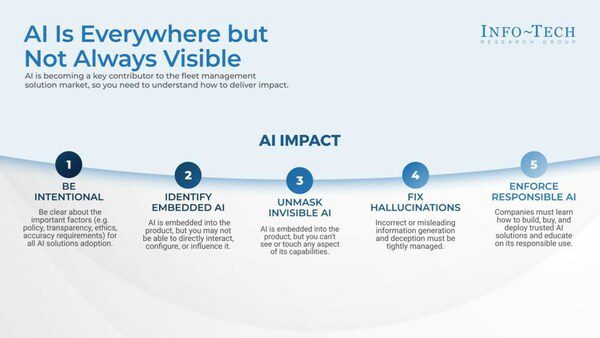- Info-Tech Research Group’s latest study explores practical use cases for AI in fleet management.
- Fleet managers face challenges like rising operational costs, safety regulations, and the need for digital transformation.
- AI adoption is crucial despite complexities, offering efficiency and innovation opportunities.
- Machine learning aids in data analysis and pattern recognition, evolving fleet management practices.
- Collaborative partnerships and strategic AI adoption are recommended for organizational success.
Main AI News:
Influenced by a confluence of market disruptions and technological advancements, organizations face formidable challenges in fleet management. These include surging operational costs, stringent safety regulations, environmental concerns, and the imperative for digital transformation. As industries hasten their digitization efforts, traditional methodologies fall short, emphasizing the necessity for innovative solutions. Against this backdrop, Info-Tech Research Group unveils its newest study, “Practical Use Cases for AI in Fleet Management,” poised to equip fleet managers with the acumen to leverage AI effectively and transform obstacles into avenues for efficiency, sustainability, and competitive advantage. The research delineates actionable use cases tailored to guide IT leaders through the nuances of digital evolution within their sector.
“Given the exponential rise in data volume propelled by technological progress, it’s increasingly impractical for humans to manually perceive and analyze data in real-time,” remarks Kevin Tucker, Principal Research Director at Info-Tech Research Group. “To keep pace with the escalating demand for scalable transportation solutions and infrastructure, fleet managers must increasingly leverage AI.”
While acknowledging the complexities and challenges inherent in AI adoption, particularly concerning legacy systems and unsupported equipment, Info-Tech’s research underscores the imperative for organizations to embrace these advancements. It emphasizes transcending complacency with outdated tools and advocates for a strategic embrace of AI, necessitating the development of robust business cases that articulate the inherent benefits and enduring value of AI integration in fleet management. Such an approach urges organizations to surmount operational and technical barriers in pursuit of enhanced efficiency and innovation.
“In fleet management, machine learning, a subset of AI, assumes a pivotal role in analyzing and interpreting the vast datasets generated by telematics systems,” Tucker elucidates. “Its core competency lies in data-driven pattern recognition and the provision of actionable insights. These systems are evolving, with the promise of offering prescriptive guidance, thereby diverging from traditional methodologies such as business intelligence.”
In its latest blueprint, Info-Tech underscores the significance of identifying AI use cases aligned with specific organizational needs to enhance operations and yield immediate dividends. Moreover, it advocates for fostering collaborative partnerships with industry peers, technology firms, and subject matter experts to facilitate shared learning and guidance.
As AI emerges as a cornerstone of fleet management solutions, comprehending its transformative potential becomes paramount. Info-Tech delineates five critical considerations for IT leaders developing their AI strategy:
- Be Intentional: Prioritize clarity regarding crucial AI adoption factors like policy, transparency, ethics, and accuracy, ensuring these factors guide decision-making processes.
- Identify Embedded AI: Acknowledge and evaluate AI integration in products, even when they are not overtly interactive or configurable, to make informed implementation decisions.
- Unmask Invisible AI: Scrutinize products to unearth hidden AI functionalities, ensuring alignment with organizational goals and risk management frameworks.
- Address Hallucinations: Devise strategies to mitigate the risks associated with AI-generated misinformation, prioritizing the establishment of safeguards against deceptive practices.
- Promote Responsible AI: Champion the development and deployment of trustworthy AI solutions, fostering an organizational culture committed to responsible AI utilization.
Moreover, Info-Tech emphasizes how AI in fleet management not only enhances product quality and punctuality but also facilitates greater adaptability to remote and hybrid work models. This technological paradigm shift enables remote monitoring, aiding employees in balancing personal and professional commitments, thereby fostering reduced stress levels and overall well-being.
Conclusion:
The insights provided by Info-Tech Research Group underscore the transformative potential of AI in fleet management. Embracing AI adoption strategically can empower organizations to navigate challenges effectively, drive efficiency, and foster innovation. Collaborative partnerships and a proactive approach to AI integration are essential for organizations aiming to stay competitive and resilient in the evolving fleet management landscape.

